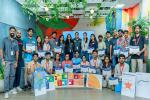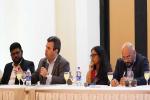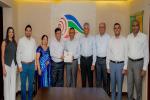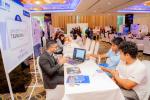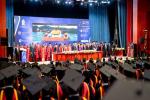Brian has also broken a record at the school, by being the first sight-impaired student to get 9 A passes at his first sitting of the GCE O-Level examination.
Brian has been a very diligent student who has consistently achieved high grades in his studies as well as in sports.
Brian’s mother has provided him the necessary support and encouragement expected of a parent for his success and we are grateful to her.
Our deep appreciation goes to the former Principal Mrs. Samanthika Jayasuriya and the teachers who guided and gave their best even during lockdown periods to coach him as well as other students to face this public examination.
It is no easy task for the teachers to bear in mind the level of impairment of each student and patiently teach them various subjects, some of which are very difficult to grasp and to express in Braille at such an examination.
Each year around 6 to 10 students and in some years over 15 students are prepared to face the GCE O- Level Examination by each school of CSDB.
In recent years, sight-impaired students have been performing well at GCE O-Level examination and in addition to the students’ commitment to study, the dedication of the Principal and teachers contributed much to their success.
Greater support from all parents is much desired for the students to be more successful.
Considering the type and level of impairment of the students, the sight-impaired students usually are more successful at the GCE O-Level examination and quite a few qualify to continue their studies up to GCE Advance Level through mainstream schools both public and private.
Further, many students qualify to enter University and most of them conventionally join the teaching profession while a few qualify in other professions such as to become lawyers.
The hearing-impaired students as well as teachers in the School for the Deaf at Ratmalana and at Nuffield School, Kaithady face an enormous challenge of very few subject specific technical terms being available in the Sri Lankan Sign Language.
Although sign language is the first language of the hearing impaired students, not having an adequate Sign Language that can appropriately handle content of school subjects, limits the vocabulary of students.
The difficulty the students face with literacy limits their attempts at the GCE O-Level examination.
While they perform well in subjects such as Geography, Art, Health Science, Music, Dancing and Religion, many do not pass in Mathematics, Science and Languages.
Hence, it has been difficult for these students to qualify to do higher studies.
However, with the Total Communication method of teaching which involves sign language, lipreading and speech, that has been adopted in these schools in recent years, students have been able to overcome some of the challenges and GCE O-Level Examination results have improved.
All three schools are committed to seeing further improvements in students’ performance at public examinations and also enables students to follow non-conventional subjects such as Information and Communication Technology, Agriculture and Food Technology etc.
At the same time, the schools encourage students who have special talent or a skill in specific vocations (e.g. catering, tailoring, graphic designing etc.) to pursue appropriate training in these fields, be career oriented and well equipped to move into society.
The CSDB was established over 109 years ago in 1912 by Church of England Zenana Missionary Society and is now managed by a Board of Trustees with the Bishop of Colombo of the Church of Ceylon as its Chairman.
The CSDB is comprised of three residential schools with over 400 students, namely; the School for the Blind and School for the Deaf at Ratmalana and Nuffield School for the Deaf and Blind at Kaithady (Jaffna).
These three special schools, follow the same curriculum as in normal schools from Grade 1 up to the GCE Ordinary Level, while specific vocational training is also provided.
Education, accommodation and other facilities are provided free of charge to the students under challenging financial circumstances.
Teachers receive special training to teach the sight and hearing- impaired at Government Teacher Training Institutions and the CSDB does its best to ensure that teachers are well equipped with a good knowledge of Braille, Sign Language and Lipreading to enhance the education of these students.
The vision of the CSDB is to transform the lives of the sight and hearing-impaired children to become independent, responsible citizens that contribute to society.







